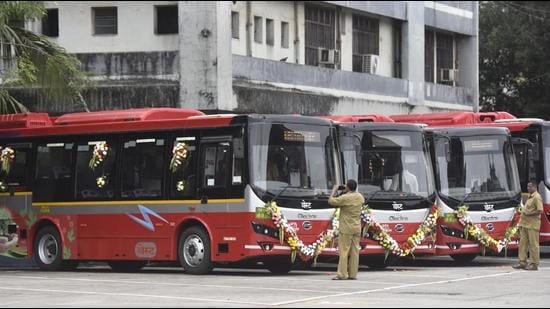The Brihanmumbai Municipal Corporation (BMC) has faced scrutiny for its allocation of nearly 80% of the air quality management funds towards the acquisition of electric buses.
This decision, made under the Mumbai Air Pollution Mitigation Plan (MAPMP), has raised concerns over the neglect of other critical pollution sources such as construction dust, road dust, and open burning of solid waste, identified as the top contributors to Mumbai’s deteriorating air quality. According to data obtained through a Right to Information (RTI) request, the BMC received ₹620.11 crore from the Central government’s Fifteenth Finance Commission (FFC) grants between 2020 and 2023. Of this, a substantial ₹493.39 crore was allocated to the Brihanmumbai Electric Supply and Transport (BEST) for the procurement of electric buses on wet-lease models.
The FFC grants, intended to enhance air quality management across urban local bodies, are disbursed based on recommendations from the Union Ministry of Environment, Forest and Climate Change (MoEFCC). However, despite the MAPMP identifying multiple pollution sources, the BMC’s allocation strategy has heavily favoured the transition to electric buses. The remaining ₹126.72 crore was sparsely distributed among other essential areas.
For instance, ₹24.68 crore was designated for a waste processing unit for construction and demolition debris, ₹24 crore for greening initiatives at schools and community spaces, ₹20.5 crore for converting conventional crematoriums to Piped Natural Gas (PNG) facilities, and ₹11.34 crore for modernising traffic systems at 70 junctions. Notably, only ₹14 crore was allocated to the Solid Waste Management (SWM) department, which is pivotal in managing debris, open waste burning, and existing landfills. While the BMC refrained from commenting, an official from the civic environment department indicated that a state government mandate from 2021 required one-third of the FFC funds to be directed towards electric buses and vehicles.
This policy guided the phased allocation to BEST from 2020 to 2023. Contrarily, a senior MoEFCC bureaucrat refuted the existence of such a mandate, stating that funds could be reallocated if the bus acquisition proved unfeasible. Experts in air quality management have emphasised the need for a balanced approach in fund utilisation. They argue that while converting the bus fleet to electric models can reduce emissions, it does not address the long-term issue posed by private vehicles. Furthermore, investments should have been made to enhance the city’s air-quality monitoring infrastructure and upgrade existing units. The FFC’s handbook acknowledges the multifaceted nature of air pollution, attributing it to sources ranging from industrial emissions to roadside dust. It highlights the necessity of robust air quality monitoring, particularly in urban areas where particulate matter levels often exceed permissible limits.


